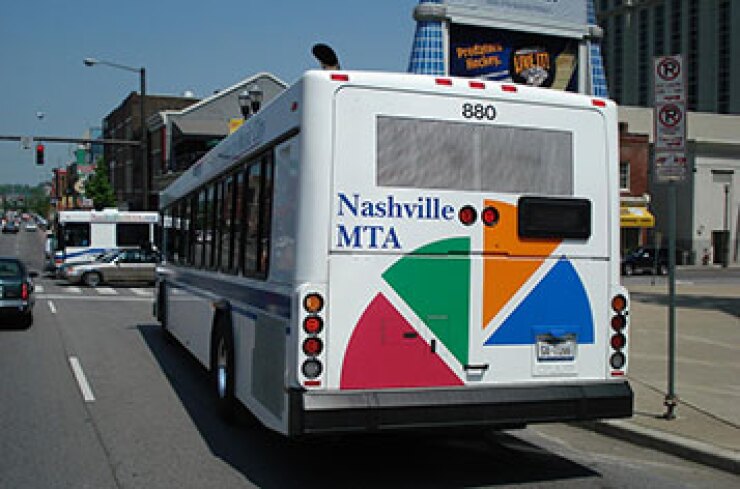
DALLAS -- Nashville residents could decide in 2018 whether to raise their local sales taxes to fund a $6 billion regional transit plan proposed by a regional planning commission as part of transportation funding legislation adopted last week by key state legislative committees.
The lawmakers amended transportation funding legislation by Tennessee Gov. Bill Haslam that would raise Tennessee's fuel tax for the first time in almost 30 years to include referendums on the sales tax increases.
The legislation passed by the committees would raise the state gasoline tax by six cents per gallon to 27.4 cents and the diesel tax by 10 cents to 30.4 cents per gallon, both of them phased in over three years.
Haslam originally sought a gas tax increase of seven cents per gallon and a boost in the diesel tax of 12 cents per gallon but later agreed to the lower rates.
The transportation proposal will be discussed at separate hearings Tuesday of the General Assembly's Senate Finance Committee and the House Local Government Committee.
The governor's transportation bill – HB 534 in the state House and SB 1221 in the Senate – would allow local transit tax referendums to be held in Nashville, Memphis, Knoxville, and Chattanooga and 12 of the largest counties in Tennessee.
The affected counties include Blunt, Davidson, Hamilton, Knox, Montgomery, Rutherford, Shelby, Sullivan, Sumner, Washington, Williamson, and Wilson.
Tennessee has a state sales tax of 7%, with counties having the option to levy a local sales tax of up to 2.75%. At least half of the revenues from county local option sales taxes must be dedicated to public education, reducing the funding available for transit efforts.
Davidson County, which includes Nashville, has available only 0.5% of the additional sales tax due to previous allocations. A sales tax increase of 0.5% would have generated $143 million in the middle Tennessee region in 2015, with almost $68 million of that coming from Davidson County, according to the Nashville Area Chamber of Commerce.
However, Haslam's bill would also allow voters to approve surcharges on local business taxes, rental car taxes, motor vehicle fees, and hotel taxes for transit. The additional revenues would have to be dedicated to transit.
A referendum on securing revenues for transit in 2018 is the goal of Nashville Mayor Meagan Barry. Barry, a Democrat who is up for reelection next year, said the additional revenue is needed to help fund the nMotion plan adopted by regional elected leaders and planning groups last year. The three-phase, $6 billion proposal includes 46 miles of light rail, 98 miles of freeway bus rapid transit, 82 miles of arterial rapid buses, 200 miles of pedestrian upgrades, and 150 miles of express bus routes on the shoulders of existing highways.
The rail projects in the plan include a new commuter line, additional passenger service on an existing rail line, and a light rail line to Nashville International Airport.
"Let's talk about my priorities: transit, transit, transit," she said. "What the plan allows for is for Nashville and other cities and counties to hold a referendum to generate revenue that would be specifically dedicated to transit funding."
The regional transit tax issue could go to voters in August or November 2018 ballot, Barry said.
"If this enabling legislation passes in 2017, it would be great to be on the ballot by 2018," she said. "Sooner than later."
A Vanderbilt University poll released March 25 found that 63% of the Nashville residents surveyed would support a sales tax increase of 0.25% for transit while 35% would not. However, 68% said they would support a higher 0.5% sales tax rate to fund transit while only 30% would oppose it.
John Greer, a political science professor at Vanderbilt who helped conduct the poll, said most area residents support higher taxes for infrastructure.
"I think it could pass," Geer said of the transit tax. "I would think she [Mayor Barry] is in pretty strong position."





